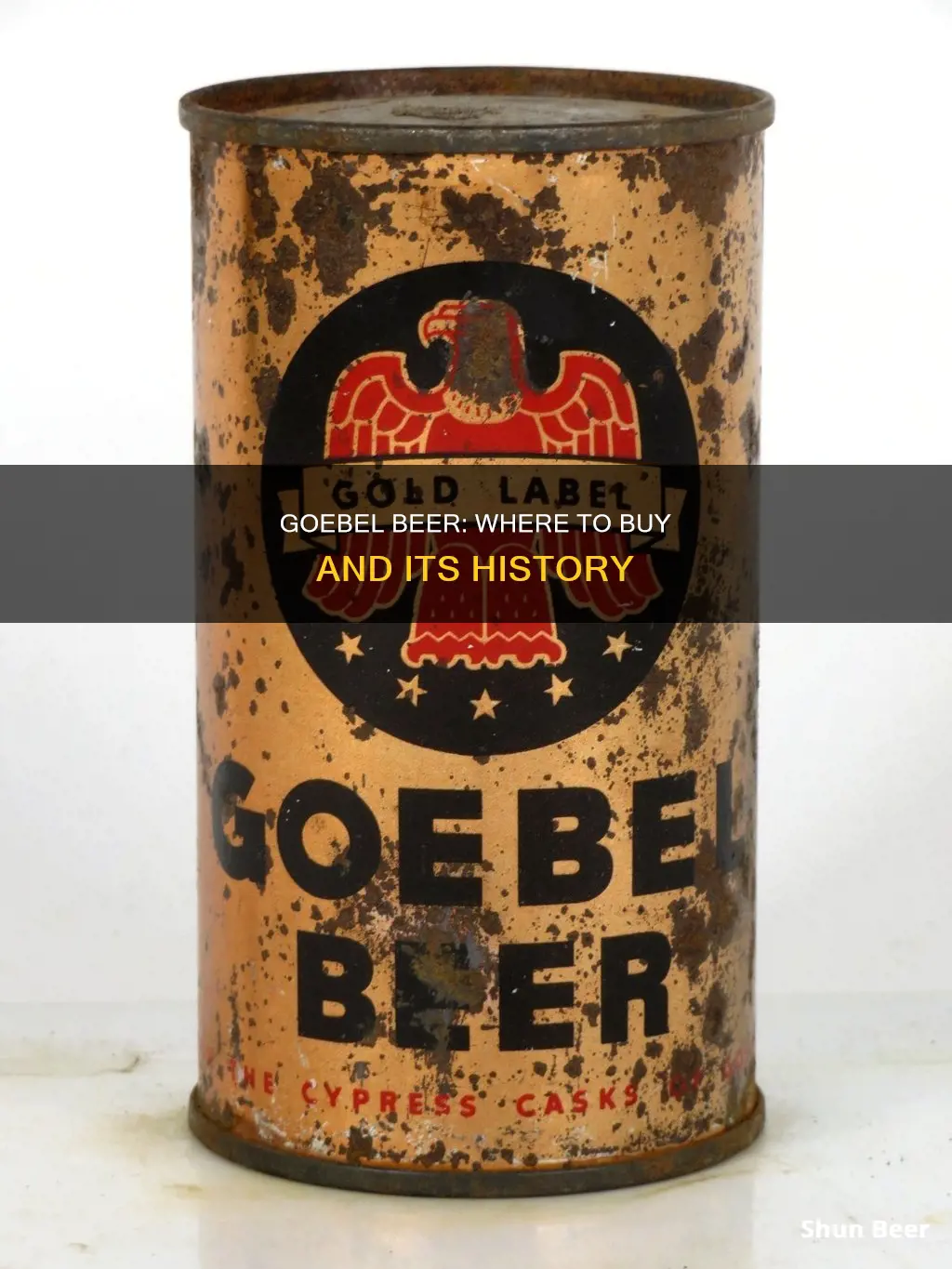
Goebel beer was produced in Detroit from 1873 to 1964, when the company was acquired by Stroh Brewery Company. Stroh continued the Goebel brand until 1999, when it sold most of its labels to Pabst Brewing Company, which continued to make Goebel until 2005. While some sources claim that Goebel was discontinued at the end of 2005, others suggest that Miller may have been contracted by Pabst to brew Goebel, and that it may have also been brought back by a microbrewery. However, as of 2024, there is no definitive evidence that Goebel beer is still being produced or sold.
| Characteristics | Values |
|---|---|
| Brewing Company | A. Goebel & Co., Stroh Brewing Company, Pabst Brewing Company |
| Brewery Location | Detroit, Michigan |
| Years of Operation | 1873-1964 |
| Years Sold | Until 2005 |
| Beer Type | Light Lager |
| Mascot | Thunder Eagle, Brewster Rooster |
What You'll Learn
- Goebel Brewing Company was founded in Detroit in 1873 by August Goebel Sr. and Theodore Gorenflo
- The company was liquidated in 1918 due to Prohibition, which banned alcohol production and sales in the US
- Goebel was popular in the 1970s and 1980s as a low-priced beer
- The brand was discontinued in 2005 after being acquired by Pabst Brewing Company
- You can find vintage Goebel Beer merchandise on Etsy

Goebel Brewing Company was founded in Detroit in 1873 by August Goebel Sr. and Theodore Gorenflo
The Goebel Brewing Company was founded in Detroit in 1873 by August Goebel Sr. and Theodore Gorenflo. Goebel Sr. was born in Prussia in 1839 and immigrated to the United States when he was 17 years old. He initially intended to go to Chicago but ran out of money on the way and ended up in Detroit. During the Civil War, he fought for the Union Army and rose to the rank of colonel. After the war, he partnered with Gorenflo to establish the A. Goebel & Co. brewery, producing a German-style, dry, light lager. The beer was an instant success in Detroit, and by the 1880s, Goebel was the city's third-largest brewery.
The company's original slogan was "from the cypress casks of Goebel," and the beer was marketed as such. As demand for their product grew, the company expanded its facilities and production capacity. In 1879, they constructed a new facility on the eastern outskirts of downtown Detroit, at Rivard and Maple streets. Over the years, they continued to expand and renovate their buildings to meet the growing demand for their beer.
August Goebel Sr. passed away in 1905, and his son, August Goebel Jr., took over the business. Under the younger Goebel's leadership, the company continued to thrive and expand its distribution beyond Detroit to several other states. The bottling facilities were expanded multiple times to meet the increasing demand. By the 1910s, Goebel had become one of the leading breweries in Detroit, known for its modern equipment and commitment to producing a wholesome and uncontaminated product.
However, the introduction of Prohibition in 1920 dealt a significant blow to the company, forcing its closure and liquidation. The Detroit plant was sold, and the company was dissolved. When Prohibition ended in 1933, Goebel began its efforts to resume operations, reacquiring some of its old factory buildings and modernizing the plant. Production restarted in 1934, and Goebel quickly regained its standing as a leading brewery in Detroit.
Over the years, Goebel's logo and mascot underwent changes. Initially, they used a "thunder eagle" as their logo, but during World War II, they changed it due to its resemblance to a Nazi symbol. By the 1950s, the mascot had become Brewster the Rooster, a popular advertising staple during Detroit sporting events.
Goebel experienced its peak in the 1950s, reaching a production of 1.3 million barrels of beer in 1953. They embarked on a series of acquisitions and expansions, aiming to expand their reach across the country. However, financial strains from these efforts, coupled with a brewery workers' strike in 1958, led to a significant decline in sales. By 1960, their output had dropped significantly, and they were unable to recover. In 1964, the company was sold to their rival, Stroh's, which continued to produce Goebel as a low-priced budget beer. Eventually, the Pabst Brewing Company acquired Stroh's and its brands, including Goebel, which was discontinued at the end of 2005.
Blue Moon Beer: Is It Available in the UK?
You may want to see also

The company was liquidated in 1918 due to Prohibition, which banned alcohol production and sales in the US
The Goebel Brewing Company was liquidated in 1918 due to Prohibition, which banned alcohol production and sales in the US. The Eighteenth Amendment, which was passed by Congress in 1917, made it illegal to produce, import, transport, or sell alcoholic beverages. This amendment was ratified by the necessary three-quarters of states in 1919 and went into effect on January 17, 1920.
The Goebel Brewing Company, founded in 1873, was a popular brewery in Detroit, Michigan, that produced a German-style, dry, light lager. The company was forced to close due to Prohibition, and its assets were sold off. The brewery plant and equipment were sold, and the company was dissolved.
Prohibition had a significant impact on the alcohol industry in the US, leading to the closure of breweries and distilleries and causing a decline in tax revenue for the government. It also resulted in the emergence of black markets and criminal syndicates dedicated to distributing alcohol illegally.
The Prohibition era lasted from 1920 to 1933, when the Twenty-first Amendment was ratified, repealing the Eighteenth Amendment and ending the nationwide ban on alcohol.
Buying Beer at New Jersey Gas Stations: Is it Possible?
You may want to see also

Goebel was popular in the 1970s and 1980s as a low-priced beer
Goebel was a popular beer in Detroit from its inception in 1873, but it gained wider popularity in the 1940s and was available in many states. The brand was particularly well-known in its latter days, in the 1970s and 1980s, as a low-priced beer.
In the mid-to-late 1970s, a case of twenty-four bottles cost $4.44, not including a dollar refund when all empties were returned. The beer was sold by the case in bottles and aluminium cans.
Goebel was taken over by Stroh Brewing Company in 1964, which continued the brand until 1999 when it sold most of its labels to Pabst Brewing Company. Stroh's marketed Goebel as a low-priced, budget beer. Pabst continued to make Goebel until the end of 2005, when it discontinued the brand.
Despite Pabst's discontinuation of the brand, some people believe that Pabst may have contracted Miller Brewing Company to brew Goebel, and that it may have been brought back by a microbrewery. However, these claims are largely regarded as rumours.
Buying Beer: Teen's Access and Adult Complicity
You may want to see also

The brand was discontinued in 2005 after being acquired by Pabst Brewing Company
The Goebel Brewing Company was a Detroit-based brewery that operated from 1873 to 1964. In 1964, the company was acquired by Stroh's Brewery, which continued to bottle the brand and market it as a low-priced beer.
In 1999, Stroh's sold most of its labels, including Goebel, to the Pabst Brewing Company. Pabst continued to produce Goebel beer until the end of 2005, when it was discontinued.
The Pabst Brewing Company is a large brewing company that has acquired several other brands. Despite Pabst's significant market presence, it appears that the Goebel brand has not been revived since its discontinuation in 2005.
While Goebel beer is no longer in production, the brand has endured in popular culture. For example, in John Bellairs' book "The Trolley to Yesterday" and its sequel, "The Wrath of the Grinning Ghost," a character is named Brewster after the Goebel Brewing Company's longtime mascot, Brewster Rooster. Additionally, vintage Goebel beer merchandise and memorabilia are available for purchase through online platforms such as Etsy.
Helium Beer: Can You Buy This Gaseous Brew?
You may want to see also

You can find vintage Goebel Beer merchandise on Etsy
While you can no longer buy Goebel Beer, as it was discontinued in 2005, you can find vintage Goebel Beer merchandise on Etsy.
Etsy has a wide range of vintage Goebel Beer items, including clothing, artwork, and memorabilia. For example, you can find t-shirts, hoodies, and sweatshirts with Goebel Beer Detroit branding, as well as vintage advertisements and beer labels.
If you're looking for something more unique, Etsy also offers a Goebel Beer bottle opener necklace, a Goebel Beer bar sign, and even a Goebel Beer coffee mug featuring Brewster the Rooster.
For those interested in the history of the brand, there are also vintage print advertisements for Goebel Brewing Company from 1941, as well as a Goebel Brewing Company employee entrance sign.
With such a variety of merchandise available, Goebel Beer enthusiasts can continue to show their support for this beloved Detroit brand, even though the beer itself is no longer in production.
Down Syndrome and Beer: Legal Drinking Age?
You may want to see also
Frequently asked questions
No, Goebel beer was discontinued at the end of 2005.
Goebel was founded by August Goebel Sr. and Theodore Gorenflo in 1873. It was acquired by Stroh Brewery Company in 1964 and then by Pabst Brewing Company in 1999.
Goebel was brewed in Detroit, Michigan.
Goebel was a light lager.
In the 1970s, a case of twenty-four bottles of Goebel beer cost $4.44, not including a dollar refund when all empties were returned.







